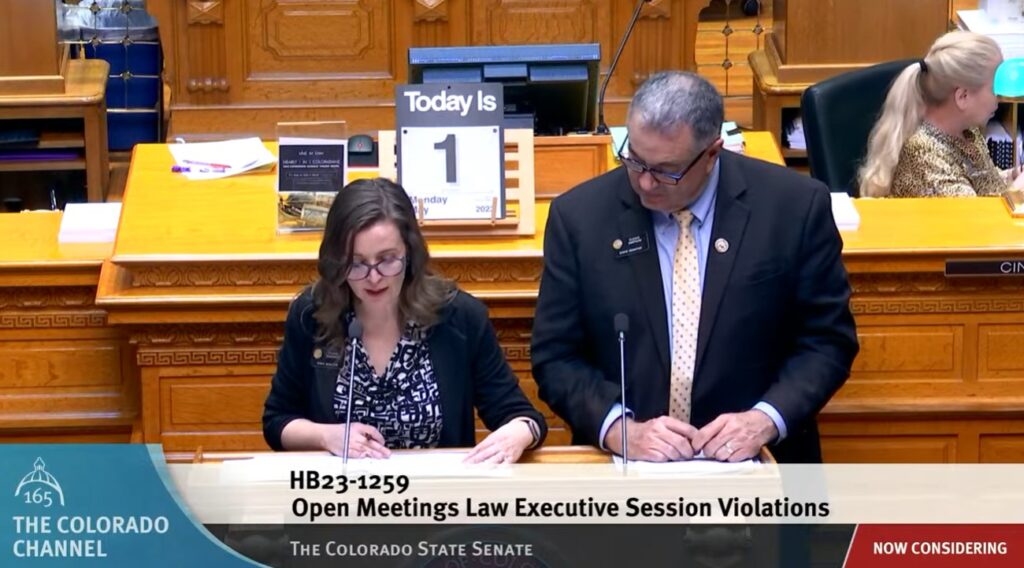Update: Gov. Jared Polis vetoed HB 23-1259 on Tuesday, June 6.
By Jeffrey A. Roberts
CFOIC Executive Director
State senators rewrote an open meetings bill Monday, leaving only a provision that bars pro se litigants who challenge the legality of executive sessions from collecting court costs and attorney fees if they prevail in court.
The strike-below amendment to House Bill 23-1259, similar to language suggested by the Colorado Freedom of Information Coalition, removed portions of the bill that would have allowed school boards and other local public bodies to “cure” an executive session-announcement violation of the Colorado Open Meetings Law at a subsequent meeting. To have legal standing to challenge a violation under the deleted language, a person would have had to provide written notice at least 14 days before a regular meeting of the public body.

The original version of the bill also required plaintiffs to pay the costs and attorney fees of local public bodies they unsuccessfully sue over executive session violations — a provision removed by a Senate committee last week.
In an email to senators Monday, CFOIC pointed out that a lawsuit filed by six news organizations Friday asks a judge to invalidate a five-hour March 23 executive session convened by the Denver school board in part because the board did not announce to the public it would be discussing behind closed doors the district’s safety policy and the reinstatement of police officers in schools. The lawsuit also alleges the DPS board violated the open meetings law by making a policy decision in secret, the day after a shooting at East High School.
“This serious omission by the school board was not a ‘small typo’ or an ‘administrative error,’ as one of the proponents of HB 23-1259 said the bill is meant to address,” CFOIC wrote. “Rather, the DPS board’s failure to announce the topic of the executive session ‘in as much detail as possible without compromising the purpose for which the executive session is authorized’ deprived the public of important information it was entitled to know.”
Proposing the strike-below amendment on the Senate floor, Sen. Rachel Zenzinger said, “We have heard loud and clear that not all actors out there are good ones, and the way that they are conducting their open meetings … and their executive sessions are problematic. We hear that criticism, and while we don’t believe that this bill is necessarily connected to those issues, we recognize that in the times that we are in it would be best that if we offered a strike-below amendment.”
Zenzinger, an Arvada Democrat, sponsored HB 23-1259 with Sen. Cleave Simpson, R-Alamosa, and Reps. Gabe Evans, R-Weld County, and Lindsey Daugherty, D-Arvada, in response to a series of lawsuits brought by Pagosa Springs attorney Matt Roane. Roane, who testified against the bill in a House committee Apr. 10, has represented himself in 46 open-government lawsuits over the past three years, often settling with school districts and other local governments for amounts of about $3,000.
Many of his civil actions concern inadequate executive session announcements. Since 2001, the open meetings law has required state and local public bodies to announce the topic of each executive session — prior to taking a vote to convene the private meeting — “in as much detail as possible without compromising the purpose for which the executive session is authorized.” Mandating topic specificity provides community members with something more than a vague idea of why their elected officials are excluding them from a meeting. It gives the public a way to police whether public bodies might be straying from the law, and it gives public officials a framework for avoiding confidential discussions of unauthorized topics.
“We understand the obligation under the law is to describe things with as much particularity as possible, and we’re endeavoring to do that,” testified Sonja McKenzie of the Colorado Association of School Executives at the Apr. 10 committee hearing. “But this is becoming problematic … This is just a gotcha so that someone can profit from it.”
“You don’t have a lawyer problem, you have a compliance problem, and what I’ve been doing is working,” Roane told the committee. “I know it’s working because I’m putting myself out of business.”
Also during that committee hearing, CFOIC president Steve Zansberg suggested to bill proponents a narrowly rewritten version of HB 23-1259 that would just bar pro se plaintiffs like Roane from recovering attorney fees in open meetings lawsuits.
The rewritten bill affects pro se legal challenges of any executive session violation, not just the adequacy of how executive sessions are announced. It also bars the assessment of costs and attorney fees against a pro se plaintiff.
The bill still requires a third-reading vote in the Senate before differences between House and Senate amendments can be reconciled.
Follow the Colorado Freedom of Information Coalition on Twitter @CoFOIC. Like CFOIC’s Facebook page. Do you appreciate the information and resources provided by CFOIC? Please consider making a tax-deductible donation.




